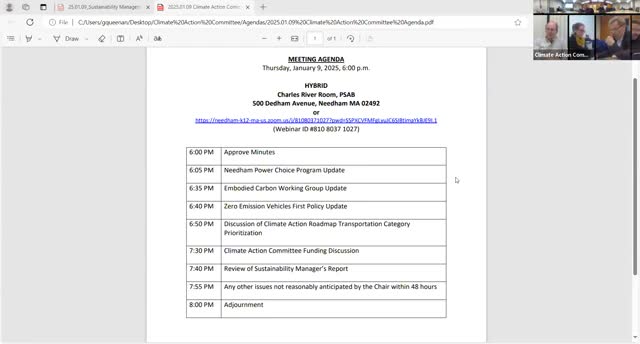Needham forms embodied‑carbon working group to study municipal buildings
Get AI-powered insights, summaries, and transcripts
Subscribe
Summary
Committee members agreed to form a narrow working group to research embodied carbon in existing municipal buildings and deliver an educational primer and potential municipal recommendations.
The Climate Action Committee agreed Jan. 9 to stand up a focused working group on embodied carbon in the built environment, with an initial charge to research and explain the concept and to propose municipal recommendations if warranted.
Nut graf: Members said the topic is broad and technically detailed, so the first task should be education: defining embodied carbon, cataloging municipal priorities and practices in peer communities, and producing a primer that could lead to policies for town municipal buildings but would avoid recommending changes to state building codes.
Steven (committee member) said the group will concentrate on embodied carbon in public and private structures but that its primary deliverable should target municipal buildings. He read a membership list that includes Lynn Denninger; Ed Quinlan, a retired energy engineer with Green Needham; Bill Paulson, a realtor; and Jess Charlap, who is a sustainability professional at Olin College. Committee members said the working group should first define scope — for example, whether to include life‑cycle impacts of demolition versus retrofit and whether to examine materials, transportation and on‑site construction impacts.
Speakers emphasized limits of local authority: committee members said the working group should not attempt to change building codes the town cannot lawfully alter, and should focus on municipal guidance that could be forwarded to the Permanent Building and Procurement Committee (PBPC) or the select board. Participants discussed whether the group’s outputs should be informational or actionable; the consensus was to start with an educational primer and options for municipal guidance, then consider policy recommendations if appropriate.
Members also discussed tools and resources: one committee member reported their firm uses a suite of embodied‑carbon tools and said any recommendation to require measurements would raise costs because designers often hire subconsultants to provide such analyses. The group agreed to gather examples from peer Massachusetts municipalities (Cambridge, Amherst, Brookline were cited) and professional organizations (for example, the Boston Society of Architects) and to return with a short list of potential guidelines or next steps for municipal buildings.
Ending: The committee assigned the working group formation and scope work and asked staff to involve technical experts and town building staff in follow‑up meetings.
